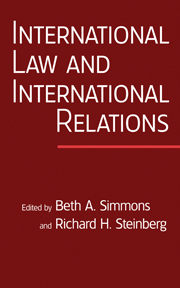Book contents
- Frontmatter
- Contents
- Contributors
- Abstracts
- Preface
- Editors' Note
- PART I INTERNATIONAL REGIMES THEORY: DOES LAW MATTER?
- PART II COMMITMENT AND COMPLIANCE
- PART III LEGALIZATION AND ITS LIMITS
- 6 The Concept of Legalization (2000)
- 7 Legalized Dispute Resolution: Interstate and Transnational (2000)
- 8 Legalization, Trade Liberalization, and Domestic Politics: A Cautionary Note (2000)
- 9 Alternatives to “Legalization”: Richer Views of Law and Politics (2001)
- PART IV INTERNATIONAL LAW AND INTERNATIONAL NORMS
- PART V TREATY DESIGN AND DYNAMICS
- PART VI LAW AND LEGAL INSTITUTIONS
- PART VII OTHER SUBSTANTIVE AREAS OF INTERNATIONAL LAW
- References
- Index
8 - Legalization, Trade Liberalization, and Domestic Politics: A Cautionary Note (2000)
Published online by Cambridge University Press: 05 June 2012
- Frontmatter
- Contents
- Contributors
- Abstracts
- Preface
- Editors' Note
- PART I INTERNATIONAL REGIMES THEORY: DOES LAW MATTER?
- PART II COMMITMENT AND COMPLIANCE
- PART III LEGALIZATION AND ITS LIMITS
- 6 The Concept of Legalization (2000)
- 7 Legalized Dispute Resolution: Interstate and Transnational (2000)
- 8 Legalization, Trade Liberalization, and Domestic Politics: A Cautionary Note (2000)
- 9 Alternatives to “Legalization”: Richer Views of Law and Politics (2001)
- PART IV INTERNATIONAL LAW AND INTERNATIONAL NORMS
- PART V TREATY DESIGN AND DYNAMICS
- PART VI LAW AND LEGAL INSTITUTIONS
- PART VII OTHER SUBSTANTIVE AREAS OF INTERNATIONAL LAW
- References
- Index
Summary
In this article we consider how increases in the legalization of the international trade regime interact with the trade-related interests of domestic actors. Although legalization may reduce incentives for cheating by individual nations, we identify ways in which the unintended effects of legalization on the activities of domestic economic actors could interfere with the pursuit of progressive liberalization of international trade. Domestic politics cannot be treated as extraneous or as an irrational source of error that obstructs the purposes of legalization. Instead, politics operates in systematic ways and is the mechanism through which legalization exerts its effects. These effects range far beyond reducing opportunism by unitary states.
Through incremental change in the postwar years, the international trade regime has evolved away from its origins as a decentralized and relatively powerless institution and become a legal entity. The number of countries and the amount of trade covered by the rules agreed to in 1947 have expanded greatly. After 1995 and the creation of the World Trade Organization (WTO), the regime further increased its demands on members by elaborating and expanding commercial rules and procedures, including those that relate to the system of settling disputes. In practice the expansion of the regime in the post–World War II period has made trade rules more precise and binding. The result is that the implications or behavioral demands of rules have become increasingly transparent to all participants.
- Type
- Chapter
- Information
- International Law and International RelationsAn International Organization Reader, pp. 157 - 187Publisher: Cambridge University PressPrint publication year: 2007

